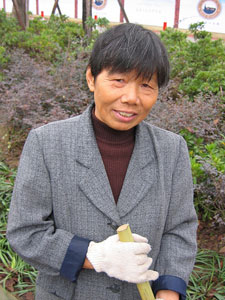HSBC Champions: Tiger who?
This story originally appeared in the November 12, 2005 edition of the South China Morning Post (subscription only).
 by DAN WASHBURN
by DAN WASHBURN
While some 2,000 golf fans weathered rainstorms to track every move of the world’s best golfer Friday in the second round of the HSBC Champions tournament in Shanghai, Yao Guang Mei swept leaves with a bamboo broom. She just might have been the only person at Sheshan International Golf Club who had never heard of Tiger Woods.
“All I know is that foreigners will come here to compete,” she said.
Yao, who lives in a village 30 minutes away from the course, gets paid five dollars a day to work at the club, where a lifetime membership costs $148,000 and furnished villas average $2 million. And she’s happy to do it.
“It looks great,” she said of the grounds. “But all of these big houses look the same. Sometimes I get lost.” Yao stopped to chuckle before adding, “Back home, I don’t get to see much of this modern society. When I got the chance to work here, I was very excited to see all of these new things.”
Golf has a long way to go before it sheds its reputation of being an elitist sport in China — because it still is an elitist sport in China. And since courses are often built in poor, rural areas, luxury homes can sit across a creek from shantytowns. Two very different worlds collide.
Sheshan Golf Club is located in Songjiang District, an hour west of downtown Shanghai. It used to be mostly farms and factories. But in recent years developers of planned communities with luxury homes have been snatching up the land. Not too far from the golf course is a mini-city called Thames Town and another named Santa Luz, boasting “original Southern California villas.”
Tournament passes for the HSBC Champions cost RMB 2,000. That’s more than the average Shanghainese family makes in a month.
“Poor people are the majority in China — they can’t be interested in a game they can’t afford,” said a man surnamed Gu, who is paid $2.50 a day to direct traffic outside the club during the tournament. “Maybe there are people who are interested, but to me, I’m only making 950 yuan a month. There’s no way I can even afford a ticket.”
Had Gu ever hear of Tiger Woods? “Nope. Sorry. This is my first day.”
A couple hundred meters beyond Gu, not too far from one of the parking lots for the tournament, 20-year old Yang Gui Lin sat on a small bridge and fished with a bamboo pole. The migrant worker from faraway Sichuan province normally would have been working at a nearby door and window factory, but he and all his coworkers were given two weeks off — unpaid — because of the golf tournament.
“I don’t know why,” Yang said. “Maybe they think we would disturb the people playing. The factory can be loud.”
Yang said he had seen golf on television before — although he had never heard the name Tiger Woods — and admitted being a little intrigued by the game. “Of course it looks interesting,” he said. “But so what? I’m never going to play it anyways. Only rich people can play golf.”
Then, 78-year-old fruit salesman Chen Zi Xue pedaled his wagon by. He had always assumed that only foreigners played golf.
“Of course I don’t know anything about golf,” he said. “I don’t speak their language. If I understood them, I wouldn’t be here selling fruit.”
